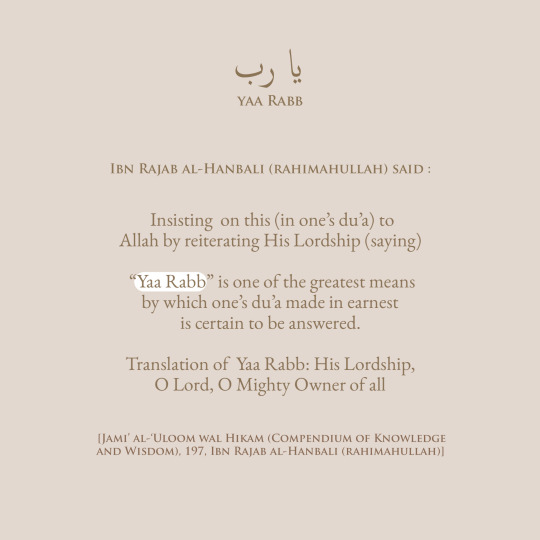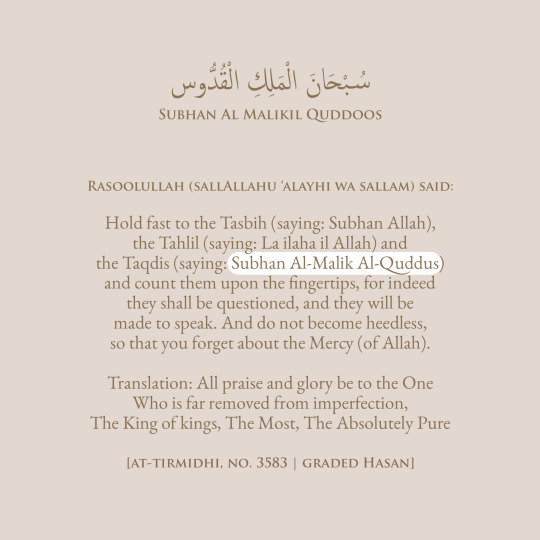Text

#adhkar#dhikr#ذكر#ذكر الله#supplication#وذكر#دعاء#رسول الله صلى الله عليه وسلم#asmaulhusna#ruqyah#اذكار#يا ربي#يا رب#اللهم اغفرلي#الدعاء#دعاء جميل#ابن رجب
10 notes
·
View notes
Text

#adhkar#dhikr#ذكر#ذكر الله#supplication#وذكر#دعاء#رسول الله صلى الله عليه وسلم#asmaulhusna#ruqyah#اذكار#دعاء جميل#اللهم اغفرلي#يا ربي#يا رب
3 notes
·
View notes
Text

#adhkar#ذكر#ذكر الله#dhikr#supplication#دعاء#وذكر#رسول الله صلى الله عليه وسلم#ruqyah#asmaulhusna#ruqya#adeeyah#fawaid
9 notes
·
View notes
Text

#dhikr#adhkar#ذكر الله#ذكر#وذكر#دعاء#supplication#رسول الله صلى الله عليه وسلم#ruqyah#asmaulhusna#ruqya#adiyah#waraqah#ورقة#fawaid#رقائق
5 notes
·
View notes
Text
Allah has sent down the best statement, a Book (this Quran), its parts resembling each other in goodness and truth, oft-repeated. The skins of those who fear their Lord shiver from it (when they recite it or hear it). Then their skin and their heart soften to the remembrance of Allah. That is the guidance of Allah. He Guides therewith whom He pleases and whomever Allah sends astray, for him there is no guide.
Surah Zumar, Verse 23
5 notes
·
View notes
Text
And Allah will never lead a people astray after He has guided them until He makes clear to them as to what they should avoid.
• Surah at-Tawbah, 9:115
7 notes
·
View notes
Text

1 note
·
View note
Text
Anas ibn Maalik (radiyAllahu ‘anhu) said:
You people do things today that you regard as less significant than a strand of hair,
whereas we, during the time of the Prophet (sallAllahu’ alayhi wa sallam) used to consider them Destructive Sins!
• Sahih al-Bukhari, Chapter on Sins That Are Seen As Insignificant but Which Should Be Kept Away From and Shaykh al-Albani (rahimahullah), Sahih al-Targhb wal-Tarhib, 2/645, no. 2473]
2 notes
·
View notes
Text
So woe to those whose hearts are hardened against remembrance of Allah! They are in plain error!
● Surat az-Zumar, 39:22
2 notes
·
View notes
Text
Imām Ibn al-Qayyim (rahimahullah) listed a few consequences of sinning/disobeying Allāh:
• Lack of success
• Corrupt views
• Blindness from truth
• Corruption of the heart
• Failing to remember Allah
• Wasting of time
• Avoidance and hate by the creation
• Separation between the servant and his Lord
• Supplication not being answered
• Hardness of the heart
• Decaying of blessing in its provision and age
• Prevention from attaining knowledge
• Humiliation
• Insults from the enemies
• Constriction of the chest
• Affliction with evil friendship, those who corrupt the heart and make one waste the time
• Prolonging of sadness and grief
• Miserable life and
• Disappointment
All this (misery) results from sinning and neglecting to remember Allāh (neglecting salah, dhikr, du’a, prescribed adhkar, recitation of the Qur’an etc).
Just as crops are grown by being watered and are consumed by fire.
● al-Fawa’id, Ibn al-Qayyim (rahimahullah), page 62
7 notes
·
View notes
Text
The believer sees his sins as if he is sitting at the foot of a mountain fearing that it might fall on him (any minute),
while the sinner (due to the hardness of his heart) sees his sins as a fly that lands on his nose, he just waves it away.
• Abdullah Ibn Mas’ood (radiyAllahu ’anhu), Sahih al-Bukhari, The Book of Supplications, Chapter on Tawbah
2 notes
·
View notes
Text
Fear (of Allaah) isn’t due to having many sins;
rather it’s from having a pure heart and perfection in your knowledge of Allaah (i.e., knowing Who Allah is)
We’ve only felt safe because of our ignorance (of the hereafter)
We’ve only felt safe because of the hardness of our hearts (against Allah’s remembrance)
For the pure heart is moved by the slightest causes of fear,
while the hard heart isn’t affected by the strongest of reminders!
● al-Khawf Haqiqatihi wa Bayaan Darajatihi, Imam Ibn Qudamah al-Maqdisi (rahimahullah)
3 notes
·
View notes
Text
Malik ibn Dinar (rahimahullah) said:
A slave is not afflicted with any punishment worse than hardness of the heart.
• Ma'alim al-Tanzil i.e., Tafsir al-Baghawi (rahimahullah), 7/115, Words of Malik ibn Dinar (rahimahullah)
1 note
·
View note
Text
The tears do not dry except due to hardness of the heart,
And the hearts to not become hard except due to frequent sins (until one consider sins as insignificant),
And sins do not increase except due to many deficiencies (lack of remembrance of Allah and forgetting the hereafter)
• Yahya ibn Muadh (rahimahullah), al-Bayhaqi (rahimahullah) in Shu’ab al-Imaan, 6828
0 notes
Text

1 note
·
View note
Text

#adhkar#dhikr#ذكر#ذكر الله#supplication#وذكر#asmaulhusna#دعاء#رسول الله صلى الله عليه وسلم#الدعاء#ruqyah
0 notes
Text

0 notes